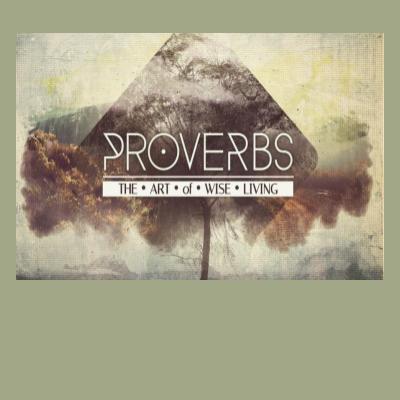SERMON SUMMARY
Proverbs may well be the most practical book in the Bible, as it teaches the art of skillful living in multiple aspects of everyday life. Verse one serves as a title to the entire book of Proverbs as Solomon is the principle author, and it is believed that he is the one who compiled all of these proverbs together into a single volume. Like his father David, Solomon loved the Lord, but also like his Dad, he had some serious flaws (1 Kings 3:3). Like us, Solomon knew the right thing to do, he just didn’t always do it.
In verses 2-7, Solomon states the purpose of this book—the end product it is designed to produce: “to know wisdom and instruction.” The word “wisdom” here is a translation of the Hebrew word that literally means “skillful living.” But this word can also be applied to life. You can become highly skilled at the art of “living well.” And Solomon goes on to give us various facets of how wisdom manifests itself in our lives.
Next, we come across the word “instruction.” It comes from the Hebrew word which refers to corrective discipline that results in changed behavior. The idea here is not self-discipline, but rather the kind of wisdom producing discipline that comes from God himself. This is the kind of discipline that comes to us when we step outside of God’s revealed order whether it involves relationships, or money, or some area of morality. If you will submit to this discipline and learn from it, you will become wise and life will be kinder to you.
Continuing in Proverbs 1:2, Solomon says, “To know wisdom and instruction, to discern the sayings of understanding, to receive instruction in wise behavior, righteousness, justice, and equity…” That word translated as “discern” in verse 2 is very important. The Hebrew word behind it refers to “the learned ability to distinguish between things that differ.” At the most basic level, that involves the ability to distinguish between that which is good and that which is evil, between courses of action that are wise and those that are foolish and possibly even dangerous. This kind of discernment isn’t a universal trait; it must be taught and learned. We need to cultivate the ability to distinguish between that which is wise and that which is foolish, between courses of action which are biased and prejudicial, and those that are just and equitable.
A person of understanding asks different questions from those who lack this dimension of wisdom. They don’t simply ask, “Is this wrong?” They also ask, “Is this wise?” And there is a world of difference between those two questions. A person of understanding always wants to know whether the choice they are making passes the wisdom test. There are many things which are wrong—we are permitted to do them—but would not be wise based upon what I see ahead.
In verse 7, Solomon tells us where wisdom begins. True Biblical wisdom is rooted in “the fear of God.” Our God is a righteous God. He is a just God, who rightly punishes the wicked. He is an all-seeing, all-knowing, all-powerful God, and we live in His world. It is a world of cause and effect. To this God, we owe our “reverent obedience.” As we have seen earlier, the author of the book of Hebrews reminds us that those whom He loves, He disciplines.
The reality is, there are two paths we can take in life: the path of wisdom or the path of folly. Both beckon us to follow their path. Which will you choose?
APPLICATION / CHALLENGE
- In what areas of your life are you heading down the path of folly? What negative consequence await you if you don’t change paths? What decision will you make to put yourself more solidly on the path of wisdom?
TAKE ONE STEP
Each week, write down one doable concrete step of obedience, small or large that you will put into practice this week. (James 1:22: “But prove yourselves doers of the word, and not merely hearers who delude themselves.”)


